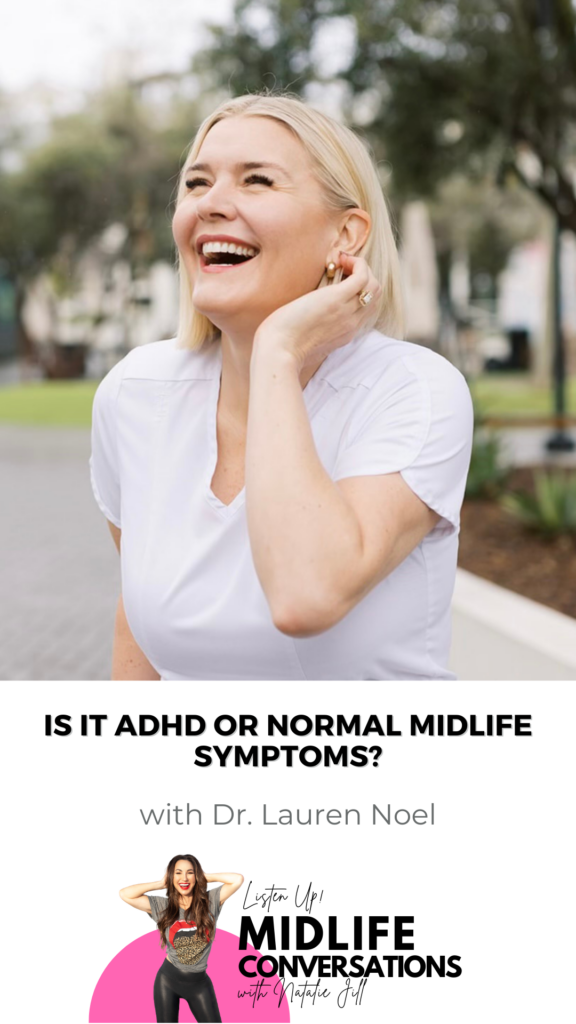Is it ADHD or Normal Midlife Symptoms with Dr. Lauren Noel
In this episode of Midlife Conversations, Natalie Jill is joined by my dear friend and naturopathic doctor, Dr. Lauren, to delve into the complexities of ADHD, particularly its impact on women’s health during midlife. We share our personal experiences living with ADHD, discuss how hormones influence symptoms, and explore strategies for managing dopamine levels without stimulants. Additionally, I talk about balancing my personal struggles while helping others through virtual consultations.
Growing up with ADHD, I was constantly told that I have a learning disability. I could not disagree with this more – I see it as a GIFT. If I am interested in something, I excel, and if I’m not, I won’t pay attention.
ADHD was first discovered in the early 1900s and was originally just studied in men. It wasn’t until the late 1900s and early 2000s that girls were really brought into it. “Stimulants” were introduced to treat these “symptoms” in order to have children with ADHD fit into standardized education requirements and performance.
There was a time about 7 or 8 years ago that my ADHD was SOOO BAD that I was driving everyone in my business nuts. My website and my emails were all gone. I had missed all of the 100s of notifications from the web provider that my everything was about to expire lol. Just like that…my business was gone. This was when I went to a psychiatrist where they prescribed me a very low dose of Adderall. What I found from it, was having my creativity zapped, and spending hours on things that really did NOT matter. For the one year I was on it, I got anxious, didn’t want to eat, and really lost who I was. The psychiatrist brought me SO HIGH on my dose that I almost passed out. It was then that I went cold turkey and never took the stimulants for ADHD again.

The ADHD Dopamine Deficit
People with ADHD have less dopamine than the average person. Taking stimulants brings them to “normal” levels. This can ease anxiety in many cases. This is why those with ADHD can thrive on chaos, while at the same time, be unable to meet day to day things like arriving on time, etc. This dopamine deficit is also the reason behind why those with ADHD cannot sit still – AND have a higher level of addiction.
ADHD Learning Curve
When you have ADHD, if you’re interested in something, you can likely learn it REALLY well through hyper fixating on it. And, on the contrary, if you’re NOT interested in something, you will be bored and not pay attention. This is normal – and you are not broken. It’s really important to use this to your advantage and apply your learning to the things that bring you joy and focus.
Females are diagnosed about ⅕ of the times males are. For males, it usually appears as hyperactivity in the body and for females, it usually appears as hyperactivity in the mind. The brain is super active but on the outside they appear as daydreaming or ditzy or airhead or aloof, etc. because they can have issues mentally processing details of what is happening.
When you have ADHD it’s not uncommon to feel like something is wrong with you and to often think things like “Why can’t I get my stuff together?! I am so messed up!” Insert your virtual hug here. The data on ADHD is staggering, in that by age 12, those with ADHD have received 20,000 more instances of negative feedback than the average person.
ADHD Fluctuations in Midlife
A lot of women in midlife are discovering they have ADHD when their child is getting diagnosed. They’re witnessing the evaluation and thinking – wow – this is also me. OR, maybe they are just finding that the demand for being or a mom or the demand for performance in midlife, exceeds the brain’s ability to keep it all together.
Hormones 100% play a role in ADHD. Estrogen is dopamine boosting. This is why when you’re pregnant you might feel fantastic, or why you feel better when you’re ovulating – and also why you may feel worse before your period or with postpartum episodes.
Getting your estrogen balanced in midlife is life changing for ADHD in midlife.
What Else Can You Do for ADHD Besides Medication? Can You Self Treat ADHD?
- Exercise – this increases blood flow to the prefrontal cortex which is the part that is typically “cold” in the ADHD and also helps to increase dopamine
- Get sunshine – sunshine activates amino acids in your body to help assimilate dopamine into your cells
- Check your micronutrients that contribute to helping make dopamine – B6, Magnesium, Zinc, Omega-3’s
- Stay away from sugar – sugar will stimulate the part of the brain that creates dopamine, but it stimulates with a spike and a crash (which will make your low baseline a lot lower) and will make ADHD worse
This and SO MUCH more on this episode!
Learn more about Dr. Lauren at:
Dr. Lauren on IG: www.instagram.com/doctor_lo
Shine Natural Medicine Website: www.shinenaturalmedicine.com
🎙️ Want to listen in on a LIVE recording of Midlife Conversations?
You can listen in, hear the episode unedited prior to launch AND stay on and ask your questions to the guest! (Don’t worry! We won’t air your questions so you can stay anonymous!) Go to Join.Midlifeconversations.com to learn more
